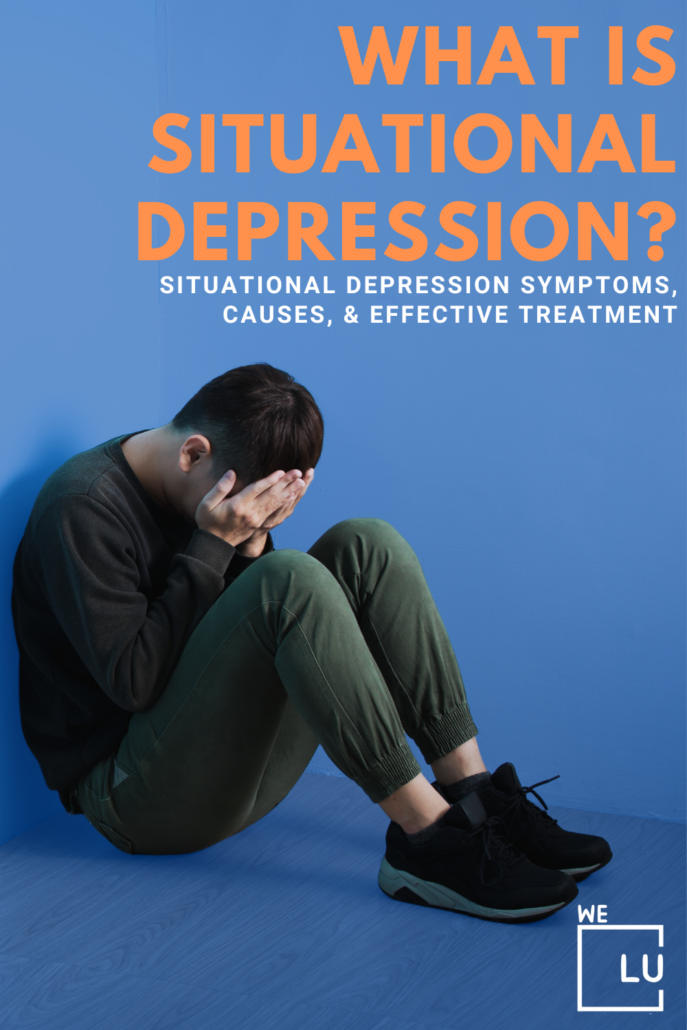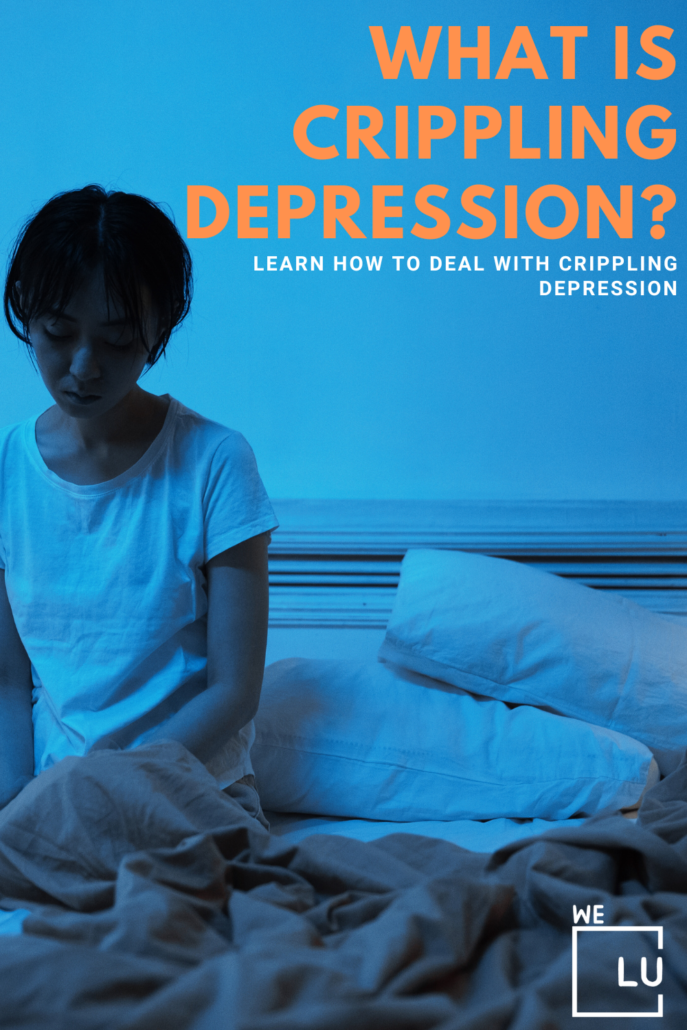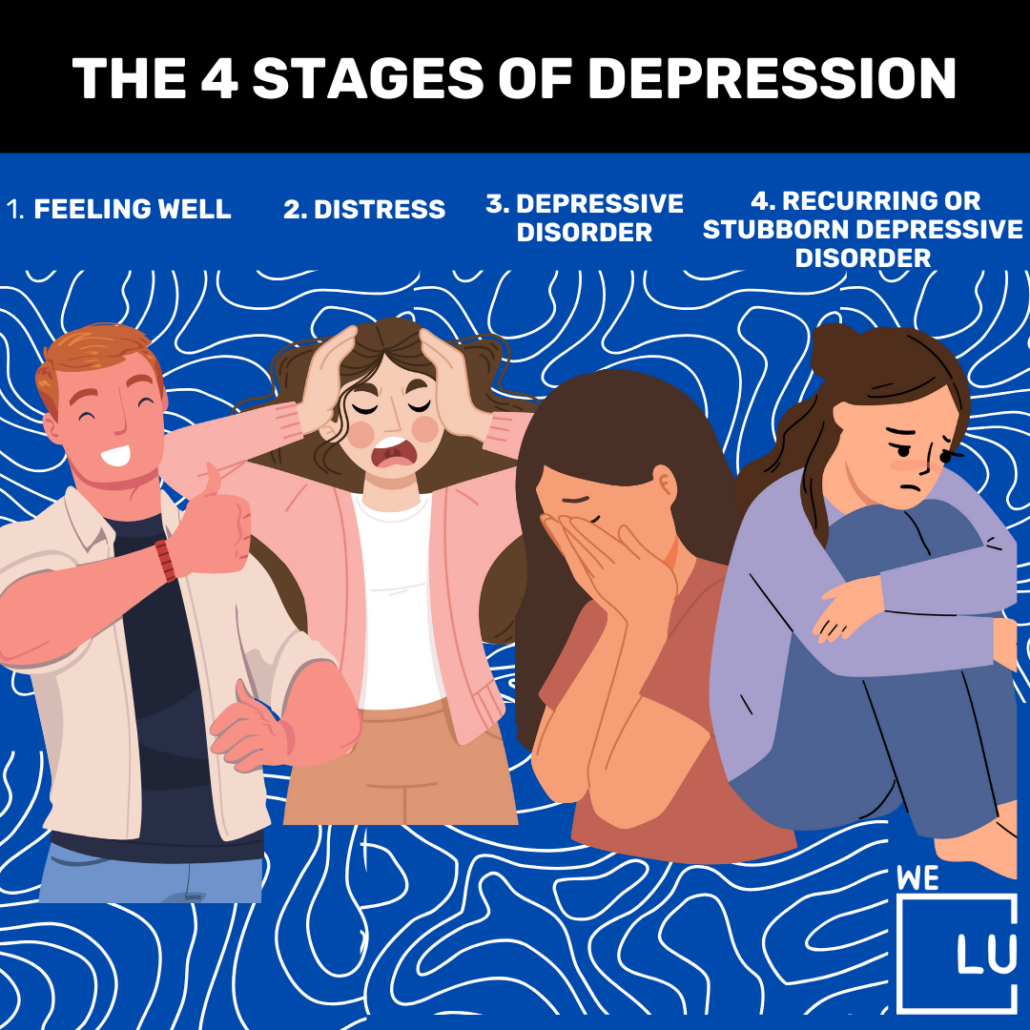What is Clinical Depression?
Clinical depression, also known as major depressive disorder or MDD is a mental health condition that makes you feel persistently sad and uninterested in things you used to enjoy. It can affect your sleep, appetite, and thinking abilities for at least two weeks to be diagnosed. While it’s a chronic condition, it typically happens in episodes lasting weeks or months, unlike persistent depressive disorder, which lasts for at least two years and is milder.
Are you struggling with the symptoms of clinical depression? Contact We Level Up Florida mental health treatment center for compassionate support and evaluation. Each call is free and confidential.
Types of Clinical Depression
There are several subtypes of clinical depression. Some of the most common subtypes include the following:
- Melancholic Depression: Characterized by severe physical and emotional symptoms, such as lack of pleasure in almost all activities.
- Psychotic Depression: Involves hallucinations or delusions alongside depressive symptoms.
- Atypical Depression: Features mood reactivity, meaning an improved mood in response to positive events, along with other specific symptoms.
- Catatonic Depression: Involves physical symptoms like motor immobility or excessive, purposeless movement.
- Seasonal Affective Disorder (SAD): Occurs seasonally, often in the winter months, and is linked to reduced exposure to sunlight.
- Peripartum (Postpartum) Depression: Occurs during pregnancy or within four weeks after childbirth.
- Premenstrual Dysphoric Disorder (PMDD): Extreme mood shifts and depressive symptoms occurring before menstruation.
- Situational Depression: Caused by specific life events or stressors.
- Chronic Depression (Dysthymia): Persistent depressive symptoms lasting for at least two years.
- Double Depression: Dysthymia and major depressive episodes co-occurring.
The experience of depression can vary widely, and individuals may not neatly fit into specific subtypes. Consulting with a mental health professional for an accurate diagnosis is essential.
The Most Common Causes and Signs of Clinical Depression
Clinical depression often comes alongside other mental health conditions, making things more complicated. This mix can make it tricky for diagnosis and treatment, needing a careful approach.
Here are some mental health conditions that individuals with clinical depression may often experience:
- Anxiety Disorders: Conditions like generalized anxiety disorder, social anxiety, or panic disorder may coexist with clinical depression.
- Bipolar Disorder: Individuals with bipolar disorder experience episodes of both depression and mania.
- Attention-Deficit/Hyperactivity Disorder (ADHD): ADHD can co-occur with depression, especially in adults.
- Eating Disorders: Conditions such as anorexia nervosa, bulimia nervosa, or binge-eating disorder may be present alongside depression.
- Post-Traumatic Stress Disorder (PTSD): Trauma-related symptoms may coexist with depression.
- Substance Use Disorders: Individuals with depression may turn to substances as a way of coping, leading to co-occurring substance use disorders.
- Obsessive-Compulsive Disorder (OCD): OCD symptoms may be present in conjunction with depression.
- Borderline Personality Disorder (BPD): BPD and depression commonly overlap.
- Schizophrenia: Although less common, depression can occur in individuals with schizophrenia.
- Chronic Pain Conditions: Conditions causing persistent pain may contribute to or coexist with depression.
These associations can vary, and not everyone with depression will experience these additional conditions. Seeking professional help is crucial for comprehensive treatment.

Skip To:
Learn More:
- Major Depressive Disorder Medication, Treatment and Symptoms
- Understanding Christmas Depression, Signs, and Coping Tips
- How Long Does Postpartum Depression Last?
- Manic Depression Vs Bipolar. Are They The Same?
- What is Mild Depression? Symptoms and Treatment
- What is Crippling Depression? Learning How To Deal With Crippling Depression
- Guide To Situational Depression Symptoms, Causes, and Effective Treatment
- Relationship Depression, Symptoms, Causes, and What To Do
- Learn How to Cope with Depression. 10 Ways to Cope with Depression.
- Dementia and Depression Connection, Top Signs, and Symptoms
Get manic bipolar depression counseling from We Level Up Florida’s mental health therapists. Reach out for professional support with a free call to our 24/7 mental health hotline.
Get Help. Get Better. Get Your Life Back.
Searching for Accredited Dual Diagnosis Mental Health Centers Near You?
Even if therapy failed previously, or are in the middle of a difficult crisis, we stand ready to support you. Our trusted behavioral health specialists will not give up on you. When you feel ready or just want someone to speak to about counseling alternatives to change your life call us. Even if we cannot assist you, we will lead you to wherever you can get support. There is no obligation. Call our hotline today.
FREE 24/7 Dual Diagnosis Mental Health Services HotlineWhat are the Symptoms of Clinical Depression?
In clinical depression, symptoms can vary in intensity but usually persist most of the day, nearly every day, for at least two weeks. Clinical depression symptoms may include the following:
- Persistent feelings of sadness or emptiness.
- Loss of interest or pleasure in activities once enjoyed.
- Changes in appetite or weight.
- Disruptions in sleep patterns (insomnia or hypersomnia).
- Fatigue or loss of energy.
- Feelings of worthlessness or excessive guilt.
- Irritability or restlessness.
Not everyone with clinical depression will experience all of these symptoms, and the severity can vary. Seeking professional help for an accurate assessment is crucial for proper diagnosis and effective treatment.
Signs of Severe Clinical Depression
If someone exhibits these severe signs, seeking immediate professional help and support is crucial. Suicidal thoughts, in particular, should be treated as a medical emergency, and assistance should be sought without delay.
Signs of severe clinical depression may include:
- Intense and Pervasive Sadness: Overwhelming feelings of deep sadness or despair.
- Profound Loss of Interest: Complete disinterest or pleasure in activities once enjoyed.
- Suicidal Thoughts: Persistent thoughts of death or a desire to end one’s life.
- Extreme Fatigue: Overwhelming and persistent lack of energy.
- Cognitive Impairment: Difficulty concentrating, making decisions, or thinking clearly.
- Physical Ailments: Unexplained physical symptoms like headaches or chronic pain.
- Isolation: Withdrawal from social activities and relationships.
Suicide Crisis Hotlines for Immediate Help
✅ If you’re facing mental health distress or concerned about a loved one needing crisis support, urgently reach out to the 988 Suicide and Crisis Lifeline. Call or text 988. You can also chat at 988lifeline.org
✅ If you’ve attempted suicide and you’re injured, dial 911 or your local emergency number. Ask someone else to call for you if you’re not alone.
✅ Learn more about our mental health recovery programs. Begin with a free call to a behavioral health treatment advisor. Contact We Level Up Florida Mental Health Treatment Center for free, no-obligation guidance from specialists who understand mental health recovery. Get in touch 24/7 at (954) 420-6627.
Do you have questions about how to treat clinical depression symptoms or clinical depression medical procedures in general? Call We Level Up Florida helpline.
Clinical Depression Treatments
Clinical depression diagnosis requires providers to assess symptoms, like low mood and loss of interest, occurring nearly every day for at least two weeks. Tests, such as blood tests, help rule out other causes and ensure an accurate evaluation.
Treating clinical depression usually involves medications and psychotherapy, with studies indicating that a combination of both is more effective. Psychotherapy, like cognitive behavioral therapy (CBT) or interpersonal therapy (IPT), involves talking with a mental health professional to address and change unhealthy emotions, thoughts, and behaviors. Antidepressant medications can also be prescribed to alter brain chemistry, though finding the right one may require trying different options.
In severe cases that do not respond to other treatments, clinical depression electroconvulsive therapy (ECT) is a safe and effective option that involves a mild electric current passing through the brain during a controlled seizure under anesthesia.
Clinical Depression Therapies
Depression therapies provide personalized ways to address the causes and symptoms, giving individuals valuable tools for managing and easing their condition. Whether through interpersonal therapy, psychodynamic therapy, or mindfulness-based cognitive therapy, these approaches help improve self-awareness, relationships, and coping strategies. With various options, individuals can choose what suits them best, paving the way for emotional well-being.
Clinical Depression Cognitive Behavioral Therapy
Cognitive behavioral therapy (CBT) stands out as one of the most effective treatments for clinical depression. This structured, goal-oriented therapy addresses the interconnected relationship between thoughts, emotions, and behaviors. By helping individuals identify and challenge negative thought patterns, CBT promotes healthier thinking and coping mechanisms. It equips individuals with practical tools to break the cycle of negative thought patterns that contribute to depressive feelings.
The collaborative nature of CBT between the therapist and the individual fosters a proactive and empowering approach, making it a highly regarded and evidence-based choice in treating clinical depression.
Other effective ways of treating clinical depression through psychotherapies include:
- Interpersonal Therapy (IPT): This approach centers on improving interpersonal relationships and communication skills to alleviate depressive symptoms. It explores how relationships impact mood and aims to create positive changes in social interactions.
- Psychodynamic Therapy: Focused on uncovering unconscious patterns and unresolved conflicts, psychodynamic therapy delves into the deeper roots of depression. Exploring past experiences and relationships aims to bring awareness to underlying issues contributing to depressive feelings.
- Mindfulness-Based Cognitive Therapy (MBCT): Integrating mindfulness practices, MBCT helps individuals break the cycle of recurrent depressive episodes. It combines cognitive therapy techniques with mindfulness meditation to enhance self-awareness and prevent the return of depressive symptoms.
- Behavioral Activation (BA): This therapy targets specific behaviors associated with depression. It encourages individuals to engage in positive activities and experiences, promoting a sense of accomplishment and improving overall mood.
- Dialectical Behavior Therapy (DBT): Originally developed for borderline personality disorder, DBT is effective in treating depression. It combines cognitive-behavioral techniques with mindfulness, emphasizing acceptance and change simultaneously, which is especially useful for managing intense emotions associated with depression.

Clinical Depression Medications
Clinical depression medications, commonly known as antidepressants, aim to rebalance brain chemicals that influence mood. There are various types, including selective serotonin reuptake inhibitors (SSRIs), serotonin-norepinephrine reuptake inhibitors (SNRIs), and others.
Finding the proper medication often involves a trial-and-error process, as individuals may respond differently. It’s crucial to consult a healthcare professional to determine the most suitable medication and monitor potential side effects.
Antidepressants may show some improvement within the first weeks, but the full benefits may take two to three months. If there’s no progress, consult your healthcare provider, who may adjust the dose or recommend a different antidepressant. Psychotherapy for clinical depression can take a few weeks or longer, with noticeable improvement often occurring after 10 to 15 sessions.
How Long is Inpatient Treatment for Clinical Depression?
Many prefer inpatient treatment for depression because it provides a structured and supportive environment. Inpatient care offers intensive therapy, medication management, and a focus on safety, allowing individuals to receive immediate and concentrated support. The close monitoring and 24/7 care contribute to a faster stabilization of symptoms, making it an appealing choice for those seeking comprehensive and direct mental health assistance.
Inpatient treatment for clinical depression varies from a few days to weeks, depending on individual needs and symptom severity. The goal is to stabilize the individual, offer immediate support, and start a treatment plan that may continue on an outpatient basis. Ongoing assessments and creating an aftercare plan for ongoing mental health support decide the length of stay.

End the Emotional Pain. Get Your Life Back.
Feeling Depressed, Anxious or Struggling with Mental Health Illness? Get Safe Comfortable Mental Health Dual Diagnosis High-Quality Therapy From Counselors That Care. Begin Your Recovery Now.
Hotline (855) 940-6125The Difference Between Clinical Depression Vs Depression
Feeling sad in challenging situations is normal, like losing a job or a relationship. Clinical depression is different—it lasts nearly every day for at least two weeks and involves more than just sadness. Some call it just “depression,” but there are various types, with clinical depression being the most severe.
Clinical depression can impact anyone, kids or adults, and it can start at any age, though it often begins in your 20s. Women are more prone to it than men. It’s also more common in those without close relationships or those who are divorced, separated, or widowed.
Clinical depression, or major depressive disorder, is widespread in the US, being one of the most common mental health conditions, impacting 5% to 17% of people at some point in their lives.
Clinical Depression Test and Diagnosis
Healthcare providers diagnose clinical depression by understanding your symptoms, medical history, and mental health background. You may be diagnosed with a specific subtype, like seasonal affective disorder (SAD) or atypical depression, based on your symptoms.
For a clinical depression diagnosis, you need five or more symptoms listed in this article, lasting nearly all day, every day, for at least two weeks. Two of these symptoms must include low mood and loss of interest in previously enjoyed activities.
Providers rule out other causes, such as medical conditions or substance use, often through tests like blood tests. They also ensure you haven’t experienced episodes of hypomania or mania, which could indicate bipolar disorder—a concern for 5% to 10% of people with clinical depression.
What are the Possible Complications of Clinical Depression?
When left untreated, depression can lead to a range of debilitating consequences. It may exacerbate existing health issues, impair daily functioning, and increase the risk of developing other mental health disorders. Also, untreated depression can contribute to a higher likelihood of suicidal thoughts or behaviors, highlighting the importance of seeking timely and appropriate interventions.
Clinical depression can lead to various complications, including the following:
- Suicidal Thoughts or Behavior: Severe depression may contribute to suicidal ideation or attempts.
- Physical Health Issues: Depression can worsen existing health conditions and increase the risk of developing new ones.
- Substance Abuse: Some individuals may turn to substance use as a way to cope with depression, leading to addiction.
- Social Isolation: Withdrawal from social activities and relationships can intensify feelings of loneliness and isolation.
- Impaired Work or School Performance: Difficulty concentrating and lack of motivation may impact professional and academic performance.
- Family and Relationship Strain: Depression can strain relationships and lead to conflicts within families.
- Chronic Pain: Depression is associated with an increased perception of physical pain.
- Financial Problems: Impaired work performance or job loss can result in financial difficulties.
- Sleep Disorders: Depression can disrupt sleep patterns, leading to insomnia or oversleeping.
- Impact on Physical Appearance: Neglect of personal hygiene and self-care may occur, affecting physical well-being.
Am I Depressed? Free Quiz
Many people experience depression, and it can affect how you handle everyday things, such as work and relationships. Are you worried if you’re experiencing depression now? Take the quiz below to explore if you may be experiencing symptoms associated with depression.
This quiz is not a substitute for professional diagnosis, so seek guidance from a mental health professional for an accurate assessment.
First-class Facilities & Amenities
World-class High-Quality Mental Health Services & Behavioral Health Substance Abuse Treatment
Rehab Centers TourRenowned Mental Health Centers. Serene Private Facilities. Inpatient Rehab Programs Vary.
Mental Health Helpline (855) 940-6125Proven recovery success experience, backed by a Team w/ History of:
15+
Years of Unified Experience
100s
5-Star Reviews Across Our Centers
10K
Recovery Successes
- Comprehensive Dual-Diagnosis Treatment
- Complimentary Family & Alumni Programs
- Coaching, Recovery & Development Events
- Comfortable Onsite Medical Detox Center
How to Prevent Clinical Depression?
While preventing clinical depression entirely may not be possible, adopting healthy coping strategies can reduce the risk and manage symptoms. Some helpful tips include:
- Build a Strong Support System: Cultivate positive relationships with friends, family, or support groups to share experiences and receive emotional support.
- Healthy Lifestyle: Maintain a balanced diet, regular exercise, and sufficient sleep, contributing to overall well-being and resilience.
- Stress Management: Develop effective stress-reduction techniques, such as mindfulness, meditation, or deep breathing exercises.
- Set Realistic Goals: Break larger tasks into smaller, achievable goals and celebrate accomplishments to foster a sense of achievement.
- Seek Professional Help: Don’t hesitate to consult a mental health professional for guidance, even if you’re not currently experiencing severe symptoms. Early intervention can be preventive.
- Limit Substance Use: Avoid excessive alcohol or substance use, as they can exacerbate depression symptoms.
- Engage in Enjoyable Activities: Prioritize activities that bring joy and fulfillment, maintaining a healthy balance between work and leisure.
Individual strategies may vary, so it’s crucial to tailor these tips to your needs. If you suspect depression, seeking professional help is vital for proper assessment and guidance.
We Level Up Florida Mental Health Treatment Center for Clinical Depression
Supportive care is essential for managing clinical depression, providing a strong foundation for individuals facing its challenges. A solid support system, including friends, family, and mental health professionals, helps individuals feel less alone and more understood.
This care involves listening, encouragement, and practical assistance, creating a nurturing environment for those dealing with clinical depression. This network is crucial for fostering resilience, promoting well-being, and enhancing the effectiveness of other therapeutic interventions.
Start your journey to healing by reaching out to We Level Up Florida Mental Health Treatment Center. Call us for a free and confidential assessment.
World-class, Accredited, 5-Star Reviewed, Effective Mental Health Dual Diagnosis Programs. Complete Integrated Inpatient Rehab with Free Post Discharge Therapy Planning.
CALL (855) 940-6125End the Emotional Pain Rollercoaster. Gain Stability & Happiness Through Recovery Treatment. Start Mental Health Counseling Today. Get Free No-obligation Guidance by Behaviroal Health Specialists Who Understand Mental Health Recovery.
Therapist Tips to Cope and Combat Manic Depressive Symptoms
Experience Transformative Recovery at the We Level Up Treatment Center.
See our authentic success stories. Get inspired. Get the help you deserve.



Start a New Life
Begin with a free call to a behavioral health treatment advisor. Learn more about our dual-diagnosis programs. The We Level Up treatment center network delivers recovery programs that vary by each treatment facility. Call to learn more.
- Personalized Care
- Caring Accountable Staff
- World-class Amenities
- Licensed & Accredited
- Renowned w/ 5-Star Reviews
We’ll Call You
Search We Level Up FL Manic Depression, Coping Tips, Mental Health Topics, & Resources
Sources
- Major Depression – National Institute of Mental Health (NIMH)
- Depression Medicines – Food and Drug Administration (.gov)
- Chand SP, Arif H. Depression. [Updated 2023 Jul 17]. In: StatPearls [Internet]. Treasure Island (FL): StatPearls Publishing; 2023 Jan-. Available from: https://www.ncbi.nlm.nih.gov/books/NBK430847/
- National, State-Level, and County-Level Prevalence Estimates of Adults Aged ≥18 Years Self-Reporting a Lifetime Diagnosis of Depression — United States, 2020 – Centers for Disease Control and Prevention (CDC)
- What is Depression? – Substance Abuse and Mental Health Services Administration (SAMHSA)
- FastStats – Depression – Centers for Disease Control and Prevention (CDC)
- What is Depression? – Substance Abuse and Mental Health Services Administration (SAMHSA)
- Depression – MedlinePlus (.gov)
- Depression – VA’s Office of Research and Development (.gov)
- Mental Health and Mental Disorders – Healthy People 2030 – Office of Disease Prevention and Health Promotion (.gov)







